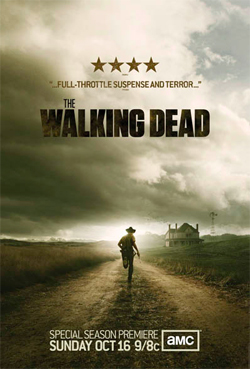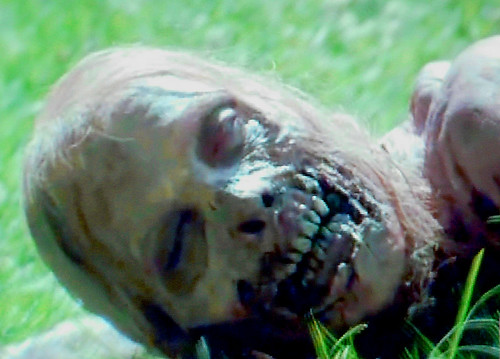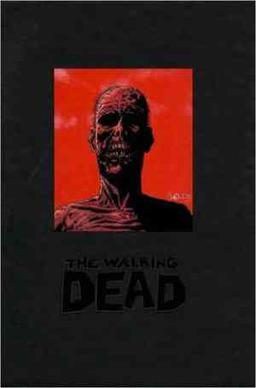One of the best things about The Walking Dead on AMC from day one was the decision to make the show a true comic book adaptation.
Despite the fact that this show stems from Robert Kirkman’s highly enjoyable Image Comics run, it has never treated Kirkman’s comics like a Bible. That’s never been more true than the conclusion of last night’s season three finale. *Spoilers Follow!*
Although The Walking Dead TV show has made clear strides to establish its own identity with all-new characters (Daryl, Meryl, Carol… uh… starting to see a trend?), it has also given fans of the comics plenty of touch points.

Season one (my favorite of the series BY FAR) had the obvious starting point of Rick waking from a coma to find a zombie wasteland. The details shifted nicely from there with the discovery of the mad scientist at the center for disease control (Those poor guys. What is today another outbreak of mad cow? Zombies? Like the flesh-eating kind? Awww, hell).
Specifics continued to alter throughout season two & three, but the core story revolved around the central components of Kirkman’s original 48 issue compendium. First there was the farm (and then there was still… the farm) and then there was the prison and the Governor. This is the natural progression of the comic book arc as well.
That all changed last night in a relatively major separation from the comics. The first of its kind.
The Walking Dead Plays Wha…Huh?
The Governor’s psychotic rampage against his own followers results in the residents of Woodbury (at this point largely led by Tyreese!) moving in to the prison with Rick and the gang.
For the most part, this is uncharted territory for The Walking Dead and it finally removes the TV series from the comic book tracks.
As those of you who’ve read the comics remember (if you haven’t RUN NOW!), the final prison shootout between the Governor and the gang resolves quite differently than it did on TV last night. And it certainly doesn’t end with the citizens of Woodbury moving in to the prison. Ain’t no living in the prison after that battle in the comics.
When season two concluded last year, I questioned whether its final images of Michonne and the prison were too reliant on fanboy recognition. In retrospect, I think season three provided some much needed change of pace and returned a lot – not all – of the show’s potential.
Season four will apparently be taking the complete opposite approach – a “What If?” scenario asking the question: What if Rick and the gang had started a community in the prison?
What’s in Store For Season 4 of The Walking Dead?
This is a harder question to answer now than it was for season three. The comics are no longer our guide.
Of course, this isn’t entirely true. Issues #50 and beyond find Rick and company exploring more post-apocalypse communities, to differing levels of absolute implosion.
In a lot of ways, a community within the prison will mirror the later story arcs revolving around the community Rick and Carl join led by the good politician from Ohio.
We could also see a slight retread of first forty-eight issue ground, as The Walking Dead now finally features Tyreese! fully integrated with the group (it’s been three seasons of waiting for hammer time- darn right dude’s getting an exclamation next to his name). And let’s not forget that the Governor isn’t exactly a resolved issue. Dude’s still one-eye squinting out there.
There’s also a very strong possibility that this separation of show and comic will help move The Walking Dead more rapidly to Kirkman’s current arc. Now that the show has largely covered what many would consider the must-read part of the comics, there’s a lot of freedom to pick and choose the elements that fans and Kirkman are going to find most interesting.
And if that syncs up with the current state of The Walking Dead comics? Well, those extra sales dollars probably won’t bother anyone involved either.
Is The Walking Dead a Good Show? Is It Good For Comics?
Although I think season three was a definite step-up from the lacklaster, dreary season two, I can’t say I’m really a fan of the show. Really, I’m a fan of the comic who feels compelled to watch the show.
There are strong moments, and as action-thrillers on TV go, The Walking Dead definitely seems to serve its purpose. But that’s the majority of the problem. The purpose of this show has become mindless action and horror.
In short, it’s just a zombie show.

This might seem like an odd complaint for The Walking Dead, but it bothers me that this show has become nothing more than eat-em-up-and-hack fodder for bored eyes.
This bothers me because it suggests that this is also true of the comics. And that totally isn’t the case!
The Walking Dead comic books are rich with strong characterization and interesting dialogue. Panels with zombies are often at their most effective as looming, ceaselessly threatening tension that motivates and drives the characters. Yes, zombies are a major part of the comics, but zombie comic is far too narrow a genre constraint for this book.

The Walking Dead TV series has failed to capture this element. Again, there are strong moments, usually brought to us by Daryl and Meryl. For the most part, though, Walking Dead can’t escape the “zombie-show” title because the characters don’t rise above that level. Imagine Breaking Bad as nothing more than a show about drug dealers. Now stop imagining, and also, it’s ok, that was just a mental exercise.
I don’t know who’s to blame for The Walking Dead’s mediocrity. It could be the writing, it could be the acting, it could be the pressure to deliver a horror movie on a TV budget, it could be a perfect storm of all of the above.
All I know is that in the comics I’m invested in the choices and actions of Rick Grimes.
In The Walking Dead on AMC, I kind of just want Rick to go away.
Because of that, I don’t feel that this is a good show yet. While it’s definitely good for comic book sales (always a good thing for the industry), I’d also argue that the general perception of this show is a disservice to Robert Kirkman’s achievement with the actual comic book run itself.
Might season four change all this with an unprecedented break from the comic book narrative?
We’ll see in the fall. It’s about time The Walking Dead on TV proved itself as a unique TV series and not just a resurrected husk of its living self.
Related articles





Leave a Reply